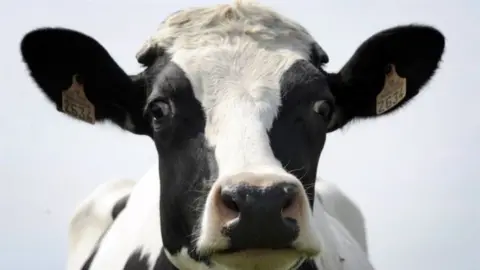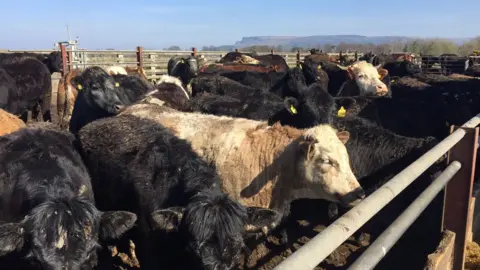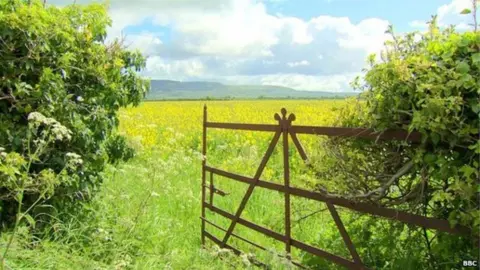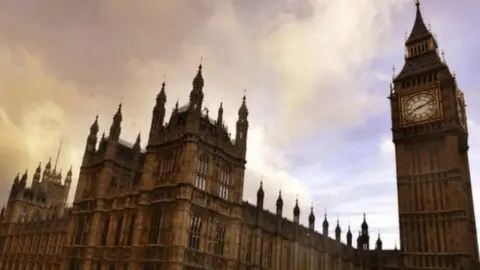Brexit: MPs hear plea to protect NI family farms
 Getty Images
Getty ImagesNorthern Ireland's farmers need certainty soon on the future of the industry after Brexit, a committee of MPs has been told.
Representatives the main agriculture sectors gave evidence to Westminster's Northern Ireland Affairs committee sitting at Stormont on Monday.
It is holding an inquiry into the impact of Brexit on farming.
Farmers spoke of the opportunities and challenges presented by the biggest change for farming in a generation.
MPs also heard an impassioned plea for any future policy to protect family farms on marginal ground and prevent land abandonment.
Peter Gallagher, a beef and sheep farmer, from the Fermanagh border was asked whether he foresaw any problems with cross-border trade.
"The problem is we don't know whether it's going to be a problem and that's the concern, it's the uncertainty around that," he said.

Six farmers gave evidence from the arable, horticulture, pig, poultry, beef and sheep and dairy sectors.
MPs were told how unfettered access to the GB market was "key" to sectors such as pigs and poultry and there were opportunities for greater expansion there.
But the politicians were also told how 30% of Northern Ireland milk crosses the border for processing and EU markets were important especially for sheep sales.
They were presented with issues which farmers believed were holding back the industry in Northern Ireland, including the "gold-plating" of regulations by officials and problems obtaining planning permission because of ammonia concerns.
Poultry producer Thomas Douglas from Dungannon said when it came to planning it was taking up to two years for some farmers to get a decision - something he described as "crazy".
County Tyrone pig producer Malcolm Keys said it was crucial that Northern Ireland continued to be part of the UK Red Tractor assurance scheme.
He said pig production had grown by 12% last year and could continue to grow at the same rate in the years ahead.

County Armagh dairy farmer William Irvine said "good will" between the UK and EU could go a long way to resolving cross-border trade issues and it was in no-one's interest for there to be impediments to trade.
County Down arable farmer Alan Chambers said there would need to be some kind of area based payment to ensure continued crop growing in Northern Ireland, something he said had reduced by two thirds in the past 50 years.
He said arable farmers provided an important environmental service creating conditions for farmland birds and other wildlife and questioned whether people in Northern Ireland wanted it to become just a "green carpet of grass" for use by the livestock industry.
Killinchy-based vegetable grower Adrian McGowan also gave evidence. He said labour issues post Brexit were important for businesses like his, and he explained how it was becoming increasingly difficult for NI producers to get their vegetables into traditional markets in the Republic of Ireland.
The issue of farm rationalisation was raised. Northern Ireland has about 24,000 mostly family farms.

Peter Gallagher said more than 9,000 of them were on marginal land considered "severely disadvantaged".
He said they provided employment for 17,000 people, many of whom moved off those farms to work in other areas of agriculture.
They were an "invaluable asset" to the wider economy and helped farm the land in ways that made it attractive for "environmental tourism".
He said that without sufficient future support, he feared a "massive shift in concentration" of farming to isolated pockets of NI, leaving 60% of the land mass abandoned.
He said it was crucial that careful thought was given to Northern Ireland's new agriculture policy and that it continued to support small family farms.
